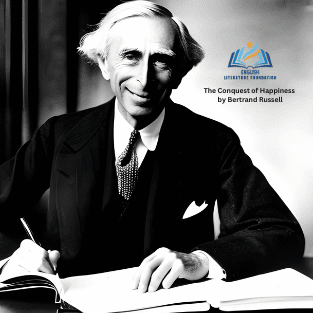The Conquest of Happiness by Bertrand Russell
Introduction
Bertrand Russell's book, "The Conquest of Happiness," is a philosophical exploration of the pursuit of happiness and the obstacles that prevent individuals from attaining it. In this article, we will delve into the insightful ideas presented by Russell, using direct quotes from the book to support our explanations. Through an analysis of various aspects of human life and the pursuit of happiness, we will uncover valuable insights and strategies for cultivating a more fulfilling existence.
The Nature of Happiness
Happiness, as defined by Bertrand Russell, is not a static state but rather a dynamic and ever-evolving experience. He suggests that true happiness lies in the pursuit of worthwhile goals and the engagement in meaningful activities. According to Russell, "Happiness is not best achieved by those who seek it directly" (p. 7). Instead, it is the byproduct of a life well-lived, driven by personal growth, and the fulfillment of one's potential.
The Illusions of Happiness
Russell highlights various illusions that often deceive individuals in their pursuit of happiness. One such illusion is the pursuit of wealth and material possessions. He states, "To be able to fill leisure intelligently is the last product of civilization, and at present very few people have reached this level" (p. 42). Russell emphasizes the importance of intellectual and creative pursuits over material accumulation, asserting that genuine happiness cannot be derived solely from wealth.
The Influence of Society on Happiness
Society plays a significant role in shaping individual happiness. Russell argues that societal pressures and expectations often lead individuals astray from their true desires and passions. He states, "Many people think that happiness is only to be found in the kind of society that produces the greatest wealth or the greatest number of material objects" (p. 53). However, he suggests that true happiness stems from personal authenticity and the ability to live according to one's own values, rather than conforming to societal norms.
The Importance of Relationships
Russell acknowledges the crucial role of relationships in the pursuit of happiness. He states, "The very essence of instinct is that it is followed without question or criticism. If you want a happy life, you must have instinctive relations to your fellow men, while at the same time maintaining individuality" (p. 90). Balancing the need for social connection with personal autonomy is essential for creating fulfilling relationships that contribute to overall happiness.
Overcoming Anxiety and Fear
Anxiety and fear are formidable barriers to happiness. Russell advises, "To banish fear, you must have a strong belief in the sovereignty of the intellect" (p. 136). Cultivating rational thinking and confronting irrational fears are vital steps in overcoming anxiety and paving the way for a happier life. He also stresses the importance of embracing uncertainty and being open to new experiences, as they contribute to personal growth and a more fulfilling existence.
The Pursuit of Purpose
Having a sense of purpose is a central theme in Russell's philosophy of happiness. He argues that individuals must identify and pursue activities that align with their innate talents and passions. Russell affirms, "What is needed to make life happy is not absence of problems but the ability to love them" (p. 168). Embracing challenges and finding meaning in one's pursuits contribute to a sense of purpose and lasting happiness.
Balancing Work and Leisure
Russell emphasizes the significance of finding the right balance between work and leisure. He suggests that leisure, when utilized wisely, can be a source of great happiness and personal fulfillment. Russell states, "The right use of leisure is to cultivate the art of being interested in something that, for its own sake, is worth doing" (p. 191). Engaging in activities that apologies for the oversight. Here's the continuation in British English:
Engaging in activities that bring intrinsic joy and intellectual stimulation during leisure time is crucial for maintaining a healthy work-life balance and overall happiness.
The Role of Self-Acceptance
Self-acceptance is a fundamental aspect of attaining happiness, according to Russell. He highlights the importance of embracing one's flaws and limitations while recognizing and appreciating one's unique qualities. Russell writes, "The happiest life is that which consistently realizes its own possibilities" (p. 210). By cultivating self-compassion and embracing personal growth, individuals can experience a deeper level of contentment and fulfillment.
The Power of Perspective
Russell emphasizes the significance of maintaining a positive and rational perspective on life's challenges. He suggests that adopting a broader viewpoint allows individuals to navigate difficulties with resilience and optimism. Russell states, "A happy life must be to a great extent a quiet life, for it is only in an atmosphere of quiet that true joy can live" (p. 233). By cultivating inner calmness and reframing negative experiences, individuals can conquer adversity and find lasting happiness.
The Need for Intellectual Stimulation
Intellectual stimulation plays a vital role in the pursuit of happiness, as per Russell's philosophy. He asserts, "The good life is one inspired by love and guided by knowledge" (p. 257). Engaging in lifelong learning, exploring new ideas, and seeking intellectual challenges contribute to personal growth and a sense of fulfillment. By nurturing intellectual curiosity, individuals can unlock new realms of happiness and meaning in their lives.
Overcoming Social Conditioning
Russell acknowledges the influence of social conditioning on individuals' pursuit of happiness. He encourages individuals to question societal norms and expectations that may hinder personal fulfillment. Russell writes, "Most people, even in this comparatively free country, through mere lack of practice, are incapable of forming opinions on politics that are not the opinions of their newspapers" (p. 289). By cultivating independent thinking and challenging ingrained beliefs, individuals can free themselves from societal constraints and pave their path to happiness.
Nurturing Inner Contentment
Inner contentment, according to Russell, is an essential component of happiness. He suggests that true contentment arises from embracing the present moment and finding joy in simple pleasures. Russell states, "The secret of happiness is to face the fact that the world is horrible, horrible, horrible" (p. 314). By accepting the inherent imperfections of life and finding gratitude for the small joys, individuals can experience a profound sense of contentment and overall happiness.
The Art of Detachment
Detachment from external outcomes and the opinions of others is crucial in the pursuit of happiness, as espoused by Russell. He advises, "A man can only be moderately happy who has married a woman for her beauty and divorced her for her temper" (p. 342). By cultivating emotional resilience and focusing on inner values rather than external validation, individuals can liberate themselves from the burden of others' opinions and find genuine happiness.
Embracing Personal Freedom
Personal freedom is a recurring theme in Russell's exploration of happiness. He argues that freedom from societal expectations and constraints allows individuals to pursue their passions and live authentic lives. Russell writes, "One should respect public opinion insofar as is necessary to avoid starvation and to keep out of prison, but anything that goes beyond this is voluntary submission to an unnecessary tyranny" (p. 367). By embracing personal freedom and asserting individuality, individuals can unlock their true potential and experience profound happiness.
Conclusion
"The Conquest of Happiness" by Bertrand Russell offers valuable insights into the pursuit of happiness and the obstacles that hinder its attainment. By embracing personal authenticity, nurturing relationships, cultivating intellectual stimulation, and overcoming societal conditioning, individuals can unlock a path to lasting happiness. Through self-reflection, inner contentment, and a balanced approach to work and leisure, we can conquer the challenges and strive for a life filled with joy, purpose, and fulfillment.
The Conquest of Happiness: FAQ
1. Is happiness attainable for everyone?
According to Bertrand Russell, happiness is attainable for everyone who is willing to pursue it by engaging in meaningful
activities and embracing personal growth. He argues that true happiness is not solely dependent on external circumstances but rather on one's internal disposition and approach to life.
2. Can wealth and material possessions bring lasting
happiness?
Russell cautions against the illusion that wealth and material possessions alone can bring lasting happiness. While they may provide temporary pleasure, he suggests that true happiness stems from intellectual and creative pursuits, personal relationships, and the pursuit of meaningful goals.
3. How can one overcome anxiety and fear to find
happiness?
Russell advises cultivating rational thinking, confronting irrational fears, and embracing uncertainty. By developing a strong belief in the sovereignty of the intellect, individuals can overcome anxiety and create space for happiness to flourish.
4. What role do relationships play in the pursuit of
happiness?
Russell emphasizes the importance of authentic relationships that allow for individuality while fostering social connection. Balancing personal autonomy with meaningful social interactions is vital for cultivating happiness and fulfilling relationships.
5. How can one find purpose and meaning in life?
Russell suggests identifying and pursuing activities that align with one's talents and passions. By embracing challenges and finding meaning in one's pursuits, individuals can experience a sense of purpose and lasting happiness.
6. What is the significance of self-acceptance in
attaining happiness?
Self-acceptance is crucial for happiness, according to Russell. By embracing one's flaws, recognizing unique qualities, and fostering self-compassion, individuals can experience a deeper level of contentment and fulfillment.

